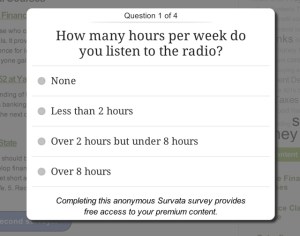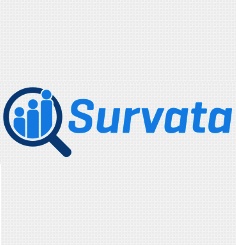Tell me if this sounds familiar: you’re checking out what’s new on the Wall Street Journal’s website, only to be stymied by a message saying the content you want to see is only available to paying subscribers. It seems like everyone has an opinion on paywalls, and even though there’s evidence that they aren’t as bad as people think, not everyone has taken kindly to the concept.
Well, if paywalls are so odious, what about surveywalls? Instead of erecting paywalls to stand between users and a content creator’s premium offerings, Y Combinator-backed Survata wants those users to take short (think 20 seconds or so), anonymous surveys in lieu of whipping out their credit cards.
Survata was founded by lifelong friends (and Notre Dame alumni) Chris Kelly and Aaron Wenger, who together saw a gap between two seemingly disparate industries.
“For publishers, paywalls and ads aren’t really working,” CEO Kelly told me. “And there’s a problem with market research — lots of money is being sent to panel companies that are stuck in the past.”
By connecting publishers and researchers, Kelly thinks Survata has managed to put together a win-win-win situation. Market researchers gain quick and valuable insight into consumer desires, those consumers get relatively painless (and free) access to content, and publishers get to monetize their content.
 The onboarding process is a simple one — researchers use a tool on the Survata site to put together their surveys, and from there they can get down into the nitty gritty: targeting. After selecting how many respondents they want to hear from, those researchers can drill down based on high level information like demographic traits or location, and more granular criteria like what web browser or operating system the respondents use.
The onboarding process is a simple one — researchers use a tool on the Survata site to put together their surveys, and from there they can get down into the nitty gritty: targeting. After selecting how many respondents they want to hear from, those researchers can drill down based on high level information like demographic traits or location, and more granular criteria like what web browser or operating system the respondents use.
Survata’s surveys are meant to be short and sweet (as they should be, considering the attention span of the average Internet user), but there are sure to be people who’ll try and blow through them as quickly as possible to access that sweet, sweet premium content anyway.
To help preserve the integrity of the data being collected, Survata’s surveys are able to track a user’s speed and answer patterns in an attempt to spot BS data in the making, so selecting option A over and over again won’t actually help users get to the goods any faster.
“We can tell the user ‘you’re answering too quickly’ for example,” Kelly said. “We’re still trying to figure out the right messages though.”
It’s a wonderfully simple concept, and one that I’d love to see supplant that standard paywall model some day, but all that depends on how much traction the service picks up with potential publisher partners. There’s no shortage of newspapers out there for instance, and a few key partnerships could give Survata some serious legs. The service has already attracted quite a bit of attention — Kelly tells me that in addition to handful of smaller companies that already use the service, Survata has worked with one highly-recognizable company whose name the team can’t officially disclose at this point. That said, Survata is nowhere near done trying to take a bite of out market research budgets wherever it can, and the team is running a promotion for the first 30 TechCrunch readers who run a Survata survey as a result.
“If you look at the market research industry and the research done online, that’s a $7 billion spend,” Kelly said. That’s a hell of a market Survata is going after, and they’re doing it bit by bit. Much like an ad network, Survata connects those data-hungry researchers with publishers, and makes a bit of money off of every question answered. Meanwhile, Survata’s publisher partners seem to be doing rather well for themselves — some of them earn over $90 per thousand pageviews, though that’s admittedly on the high side for them.
If all this sounds a little familiar, it’s probably because Google announced a very similar initiative just a few months ago. It goes without saying that Google is a hell of a player for a startup to go up against, but Kelly still feels that Survata is a few crucial steps ahead of the search giant. It’s cheaper to deploy a Survata survey into the wild for one, as Survata’s minimum survey spend is $10 compared to Google’s $100 (though Google’s partnerships with content providers like Pandora and the New York Daily News may ultimately prove to be more rewarding). More importantly, Kelly says that Survata will soon offer researchers the ability to target consumers based on more fine-grained criteria (like behavior) than just demographics, while Google’s approach requires those researchers to qualify respondents with a screening question first.
Regardless of Kelly’s claims, there’s still plenty of work to be done if Survata wants to overtake Google as the surveywall provider of record, but for now he doesn’t seem too worried about it:
“Overall, we’re not too focused on the competition,” he said. “This ‘survey monetization’ space is new, so we’re excited to be a major part of it as it grows.”
